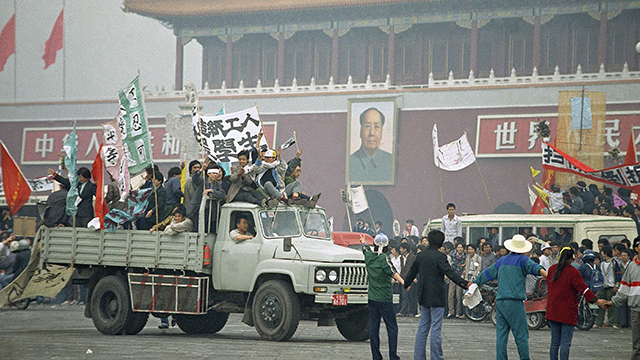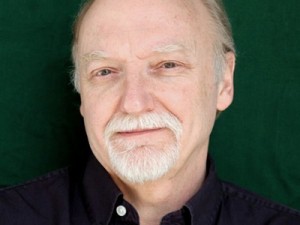This post first appeared in The Nation.

Demonstrators parade past the Gate of Heavenly Peace and the portrait of Mao Tse-Tung, to rally in Tiananmen Square on May 18, 1989 in Beijing, China. (AP/Sadayuki Mikami)
The music of Beethoven has inspired and been used in protests around the world for decades. This is one of the key themes in our new film Following the Ninth, a documentary exploring the worldwide cultural and political influence of Beethoven’s masterpiece, the Ninth Symphony.
The film inspired the book Journeys With Beethoven, which I wrote with the film’s director, Kerry Candaele. In this excerpt, written by Candaele, we see how Beethoven helped fuel the Tiananmen Square uprising in China.
At Tiananmen Square in 1989, students played the Ninth Symphony over makeshift loudspeakers as the troops came in to crush their democratic moment. Feng Congde, one of the leaders, told me how he and his fellow protesters wanted the world to hear their message of hope for China and how the Ninth summed up that hope. Congde borrowed car batteries from supporters who lived in the neighborhoods near the square, powered up a pirate radio system and listened as the “Ode to Joy” countered the droning music and speeches of the Chinese Communist Party.
As the students had no weapons, music and other forms of symbolic communication would serve as a fragile carapace under which students and others could shape, if only momentarily, the resources for resistance while simultaneously telling the world via music what their struggle meant. Or as Feng put it, “We used the Ninth to create an ambience of solidarity and hope, for ourselves and for the people of China.”
One image in the footage of the protest appears again and again: people singing. It commanded attention and brought people face-to-face with what Feng called “their dignity as human beings,” as if for the first time.
Beethoven’s Ninth provided a bridge for those connections. Classical music in general and Beethoven’s Ninth specifically was considered a symbol of Western bourgeois decadence and cultural imperialism by the Communist Party, especially during the years of Mao’s Cultural Revolution from 1966 through 1976. Even in 1989 Feng felt the lingering effects of a decade when the “violence of culture” meant “all the good things were denied. If you liked modern dance, that was bourgeois. If you liked modern painting, that was bourgeois.”
On the square, Beethoven’s Ninth became part of Feng’s crime against the state. Once engaged as an organizer, Feng set up a makeshift broadcasting system, cobbled together with car batteries and loudspeakers provided by both university students and working people from the surrounding neighborhood. The improvised system could not compete with the government speakers that lined the square, broadcasting the droning speeches of Li Peng and other lesser apparatchiks who tried to convince those arriving by the tens of thousands to stay home or return to school.
Feng described a singular moment on the square when Beethoven’s Ninth summed up everything he hoped for his country.
With over a thousand students on a hunger strike in the square, Li Peng announced martial law on May 19. In the square, Feng pulled out a cassette. “The students, when we heard the announcements,” he told me, “we were so angry — and I put on the cassette of Beethoven’s Ninth to cover the voice of the government system. So there was a real battle for voice. Hundreds of thousands of students shouting, as we broadcast the music on the square louder than the government system. I just had a feeling of winning, of triumph.”
Feng played the final movement of the Ninth, featuring the “Ode To Joy” with the key line Alle Menschen warden Bruder (All men will be brothers) because “it gave us a sense of hope, solidarity, for a new and better future. And it was really fantastic that it changed us, transformed us. We feel finally we regained our dignity as human beings. We were separated by the government, but now we are free. We just feel free. So on the square, we feel a collective feeling of joy. We were free at last.”
The Ninth is high-wire music written without a net below. Once in a while disparate experiences, different artifacts a long distance from one another in time and space, come together and make perfect sense. Beethoven’s Ninth Symphony at Tiananmen Square squawking over small speakers as the troops were coming to crush the movement makes perfect sense.
But the fourth and final movement at Tiananmen did not end in a transcendent shout of joy: “We just feel a real new hope — and the tanks and the machine guns killed that hope.”


